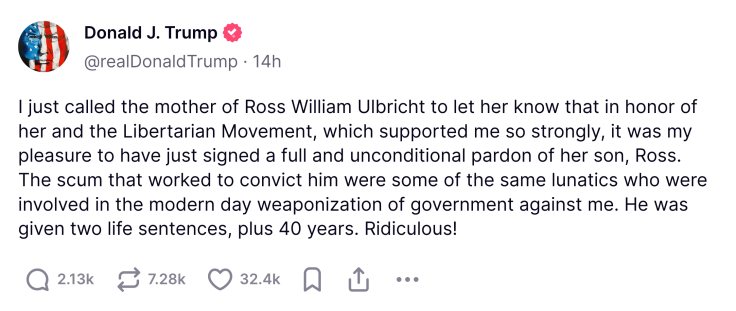Who Is Ross Ulbricht and What Did He Do: Donald Trump Pardons Silk Road Founder
Ulbricht's platform has been called 'the most notorious online criminal marketplace of its day' by law enforcement.

US President Donald Trump has made headlines once again by granting a full and unconditional pardon to Ross Ulbricht, the controversial figure behind the infamous Silk Road darknet marketplace. This move has sparked a mix of outrage and celebration, with Ulbricht's supporters hailing it as justice while critics call it a dangerous precedent.
Ulbricht, aged 40, was released from the United States Penitentiary in Tucson on Tuesday, marking the end of a contentious saga that has divided public opinion for over a decade.
The Silk Road: A Dark Web Empire
The Silk Road was an online marketplace operating on the dark web from 2011 to 2013, allowing users to anonymously trade illicit goods and services. According to the FBI, the platform primarily facilitated the sale of illegal drugs, though it also offered hacking tools, counterfeit documents, and other unlawful items. Transactions were conducted using Bitcoin to maintain anonymity.
In just two years, the Silk Road reportedly amassed around £131 million ($200 million) in revenue, earning Ulbricht over £10 million ($13 million) in Bitcoin commissions. The platform's unprecedented success made it a focal point for law enforcement, which launched an extensive investigation to identify and apprehend its creator.
A Trail of Clues Leads to Ulbricht
The FBI and other agencies pieced together a complex digital trail to uncover Ulbricht's identity. According to federal documents, investigators linked a forum post promoting the Silk Road to an email address tied to Ulbricht. Further scrutiny of network records solidified their suspicions, culminating in Ulbricht's arrest on 1 October 2013 in a San Francisco library.
At the time of his arrest, Ulbricht was operating under the pseudonym "Dread Pirate Roberts," a name inspired by a character from the film The Princess Bride. His laptop, seized during the operation, provided critical evidence against him.
Charges and Controversial Sentencing

In 2015, Ulbricht was convicted of a range of charges, including drug trafficking, money laundering, and computer hacking. Prosecutors argued that his actions contributed to multiple deaths from drug overdoses and even accused him of soliciting murders-for-hire, although no evidence was found that any killings took place.
Manhattan U.S. Attorney Preet Bharara described Ulbricht as a "criminal profiteer" who exploited addiction for financial gain. The court handed Ulbricht a life sentence without parole, a punishment many viewed as excessively harsh.
District Judge Katherine Forrest, who presided over the case, emphasised that the sentence was intended to serve as a deterrent, stating that Ulbricht was "no better than any other drug dealer."
Trump's Pardon: A Libertarian Triumph?
Trump's decision to pardon Ulbricht has reignited debates about government overreach and criminal justice reform. Per reports from Reuters, Trump announced the pardon at the Libertarian National Convention, a move praised by the Libertarian Party, which supports drug legalisation and opposes harsh sentencing for non-violent crimes.
Critics, however, see the pardon as undermining the judicial process. Bharara called it a "dangerous precedent," arguing that it sends a message of leniency for serious crimes. Meanwhile, Trump defended his decision, describing the sentencing as "ridiculous" and claiming that the same individuals responsible for prosecuting Ulbricht had unfairly targeted him during his presidency.
Cryptocurrency and the Silk Road Legacy
The Silk Road's closure and Ulbricht's arrest did little to deter the rise of similar darknet marketplaces. According to the US Department of Justice, law enforcement seized over £812 million ($1 billion) worth of Bitcoin linked to the Silk Road in 2020, highlighting the platform's enduring impact on the illicit economy.
Despite Ulbricht's claims that he created the Silk Road to promote personal freedom and privacy, the site's notoriety has left a lasting stain on his legacy. As Trump's pardon continues to make waves, the case raises larger questions about the balance between justice, reform, and accountability in the digital age.
A Divided Public Reaction
The pardon has drawn mixed reactions from politicians, activists, and the public. Republican Congressman Thomas Massie praised Trump for fulfilling his promise, stating, "This is a victory for those who believe in justice and personal freedom." On the other hand, critics argue that the pardon could embolden future offenders to exploit the dark web for criminal activities.
As the dust settles, the case of Ross Ulbricht serves as a potent reminder of the complexities of justice in the digital era, where anonymity and innovation often clash with law enforcement and ethical boundaries.
© Copyright IBTimes 2025. All rights reserved.






















